Why ClickFunnels Is Not a Scam, Pyramid Scheme, Or MLM
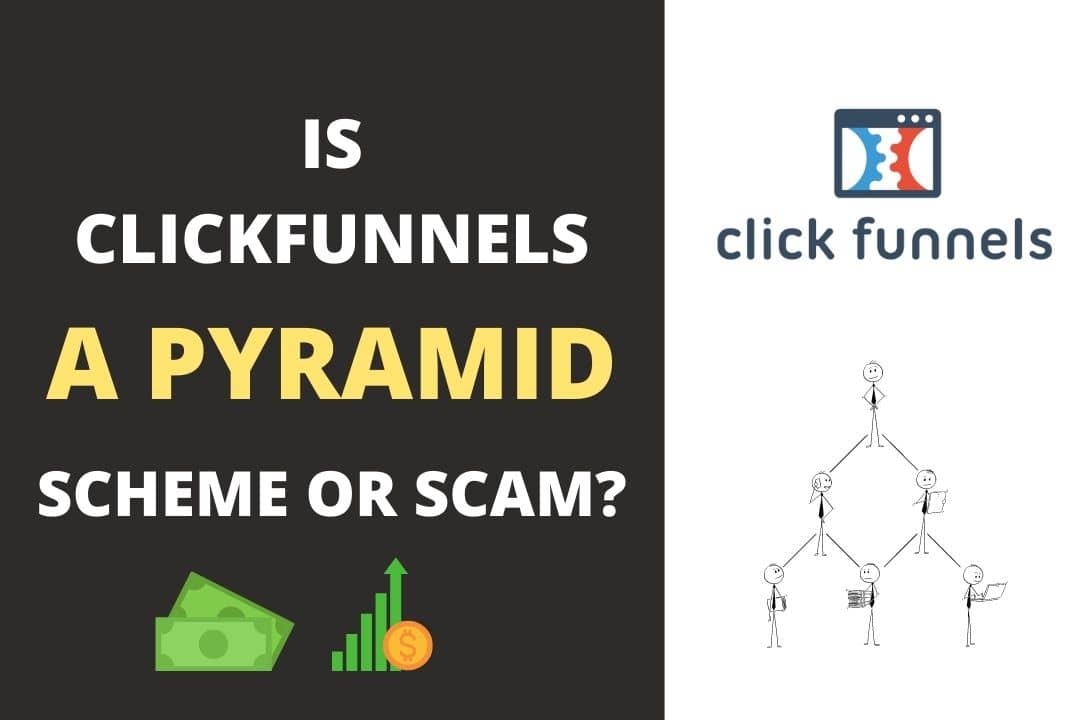
Some people call Clickfunnels a scam, a pyramid scheme, and others warn it’s just another MLM. These worries come up because of how some people misuse and market ClickFunnels.
The biggest issues people point to are:
- Scammers who use ClickFunnels for fake schemes, hurting its reputation
- Aggressive affiliate marketers who care more about recruiting than helping customers
- Users reporting slow customer support and billing problems
- Technical glitches that make the software hard to use
- Monthly costs start at $97, which some feel is too expensive
- Marketing that promises quick success but doesn’t match real results
While these concerns are real, they don’t tell the whole story. In this article, we’ll look at five key questions:
- Is ClickFunnels a pyramid scheme?
- Can you trust the company?
- Why do people have trouble canceling?
- Are the success stories real?
- What happens to your money in their training programs?
Let’s explore what’s really going on with ClickFunnels and separate fact from fiction.
Understanding ClickFunnels & Business Model
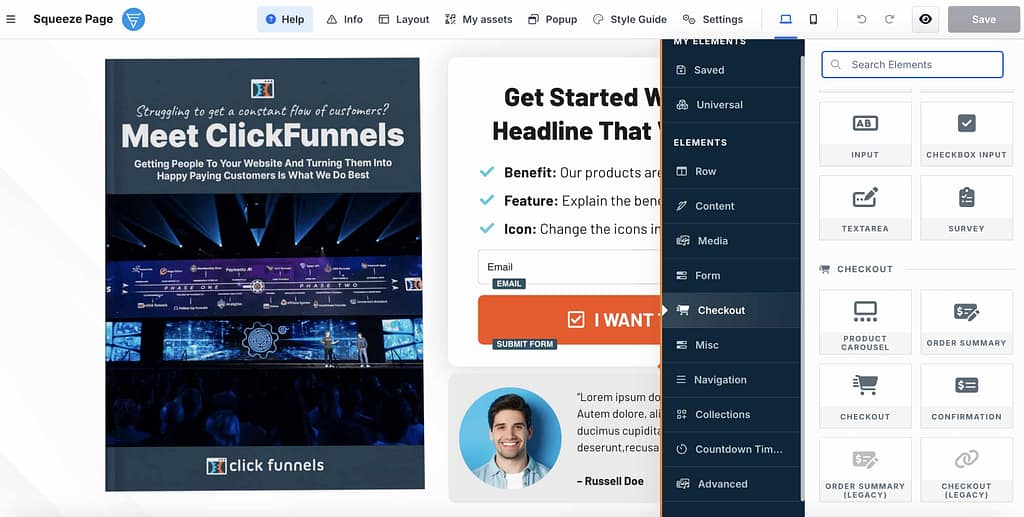
ClickFunnels was created in 2014 by Russell Brunson and Todd Dickerson. They saw a problem they wanted to fix: Business owners were using too many different tools to sell online, which was getting expensive and confusing. So, they built ClickFunnels to put everything in one place.
Think of ClickFunnels as a digital Swiss Army knife for selling online.
Instead of needing separate tools for your website, email lists, and payment system, ClickFunnels integrates them all.
Of course, this is NOT a ClickFunnels review or ClickFunnels pricing article. So we won’t dive too deep into those details. But to understand why some folks call it a scam, we need to know the basics.
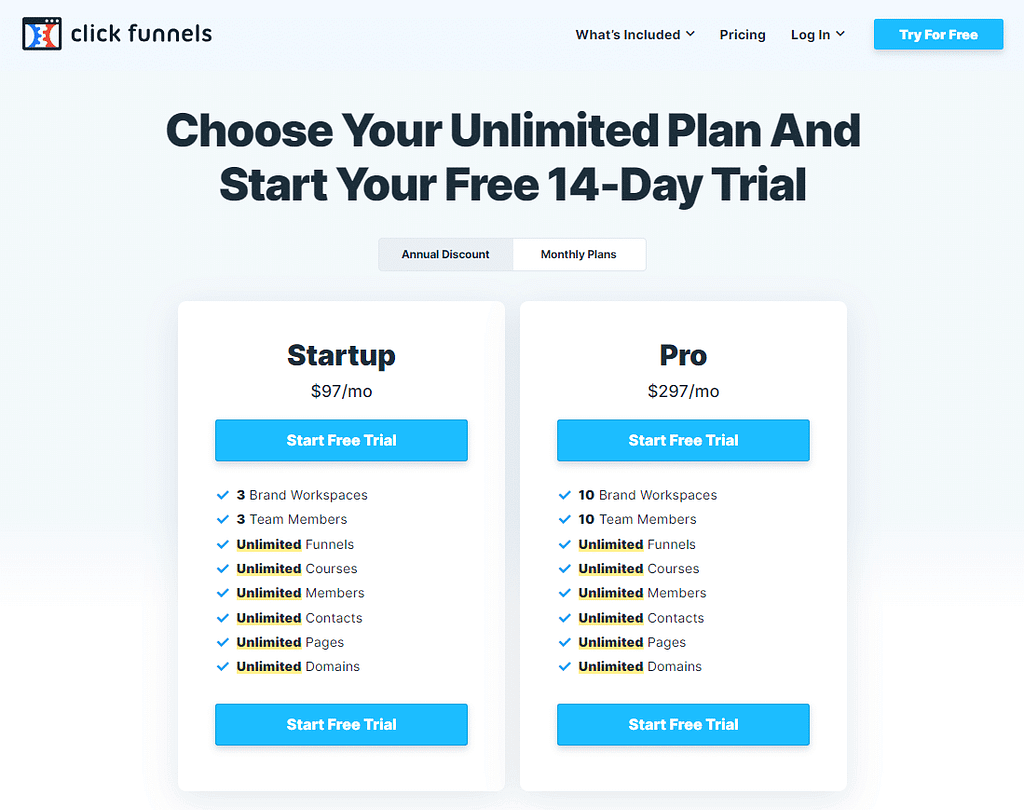
The way they make money is pretty simple. Their main business comes from monthly subscriptions.
- The Starter plan costs $97/month and lets you build unlimited pages and funnels. You get three team members and three workspaces for different brands.
- The Pro plan at $297/month gives you 10 team members and 10 workspaces.
They also offer training programs for people who want to learn more.
Their most popular one is the One Funnel Away Challenge for $100. More advanced programs like Funnel Builder Secrets can cost $1,997-$9,997.
Once a year, they run a big event called Funnel Hacking Live, where tickets cost $997.
They also earn money by selling books and running an affiliate program in which people earn commissions for recommending ClickFunnels to others.

What makes ClickFunnels different from regular website builders is its focus on guiding customers through a sales process. Every page has a purpose – to move visitors closer to making a purchase.
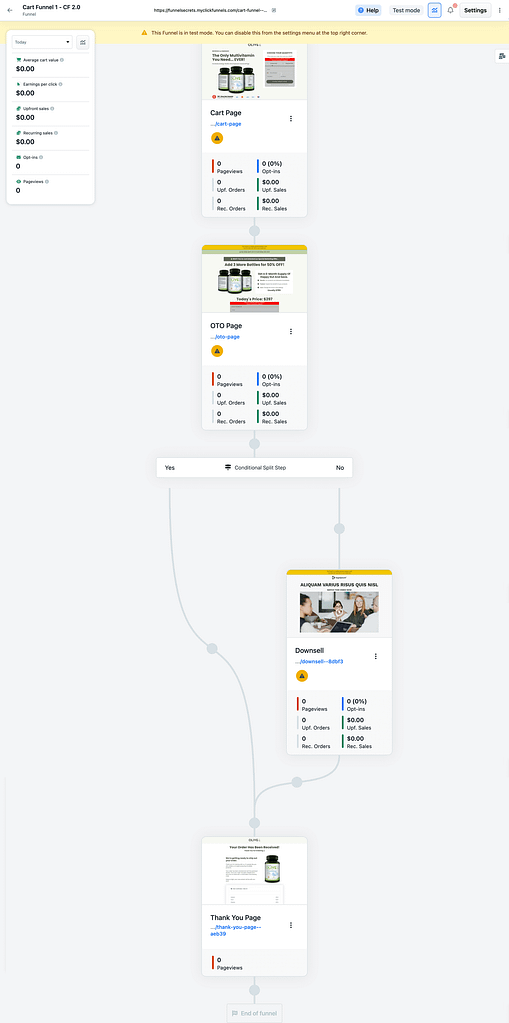
Remember, you don’t need to buy their training or attend events to use ClickFunnels. The software works just fine on its own. These extra offerings are there for people who want to learn more about funnel building, selling, and online marketing.
Next, let’s look at why some people think ClickFunnels is a pyramid scheme, and why they’re wrong about that.
Is ClickFunnels Really a Pyramid Scheme?

People might have said, “ClickFunnels is just another pyramid scheme!” Let’s talk about why this isn’t true.
First, let’s understand what a pyramid scheme really is.
Imagine if your friend asked you to pay $100 to join a “super special club.” The only way to make money in this club is to get other people to join and pay their $100.
Those people then have to find more people, and so on. That’s a pyramid scheme – it’s all about recruiting others to make money.
Now, here’s how ClickFunnels is different:
- They sell real software that businesses use every day. It’s like buying Microsoft Word or Photoshop – you pay to use a tool.
- You don’t have to get anyone else to join to use the software. Lots of business owners just use ClickFunnels to build their websites and never tell anyone about it.
- If you do want to tell others about ClickFunnels (through their affiliate program), you only get paid when someone buys the software. You don’t get paid to recruit other affiliates.
Think of it like recommending your favorite restaurant to friends. The restaurant might give you a gift card when your friends eat there. But you don’t have to make your friends go around telling more people about the restaurant.
That’s how ClickFunnels works – SIMPLE!
The confusion often comes from some overexcited affiliates who make it sound like a get-rich-quick scheme. But that’s not ClickFunnels’ fault – it’s just people getting too pushy with their marketing.
The same situation has occurred with ClickFunnels’ competitors, such as Systeme.io, Leadpages, Kartra, and Keap, all of which also offer affiliate programs with commissions ranging from 20% to 40%, similar to ClickFunnels.
Is ClickFunnels Itself Legitimate?
Now that we know ClickFunnels isn’t a pyramid scheme, let’s talk about whether it’s a company you can trust.
After all, you want to be sure your money is safe.
Think of ClickFunnels like a regular tech company – similar to the tools you already know and use. It’s a real business based in the United States, with an actual office in Boise, Idaho. They pay taxes, have real employees, and follow business laws.
Here’s what makes them legit:
They’ve been around since 2014, which is pretty long in the software world. That’s nearly 10 years of helping businesses sell stuff online. Companies that are scams usually disappear after a few months.
Some really big names use ClickFunnels in their own businesses.
Tony Robbins, who teaches people about business success, uses it to sell his book “Money: Master The Game.”

Daymond John from the TV show Shark Tank runs his business with Clickfunnels.
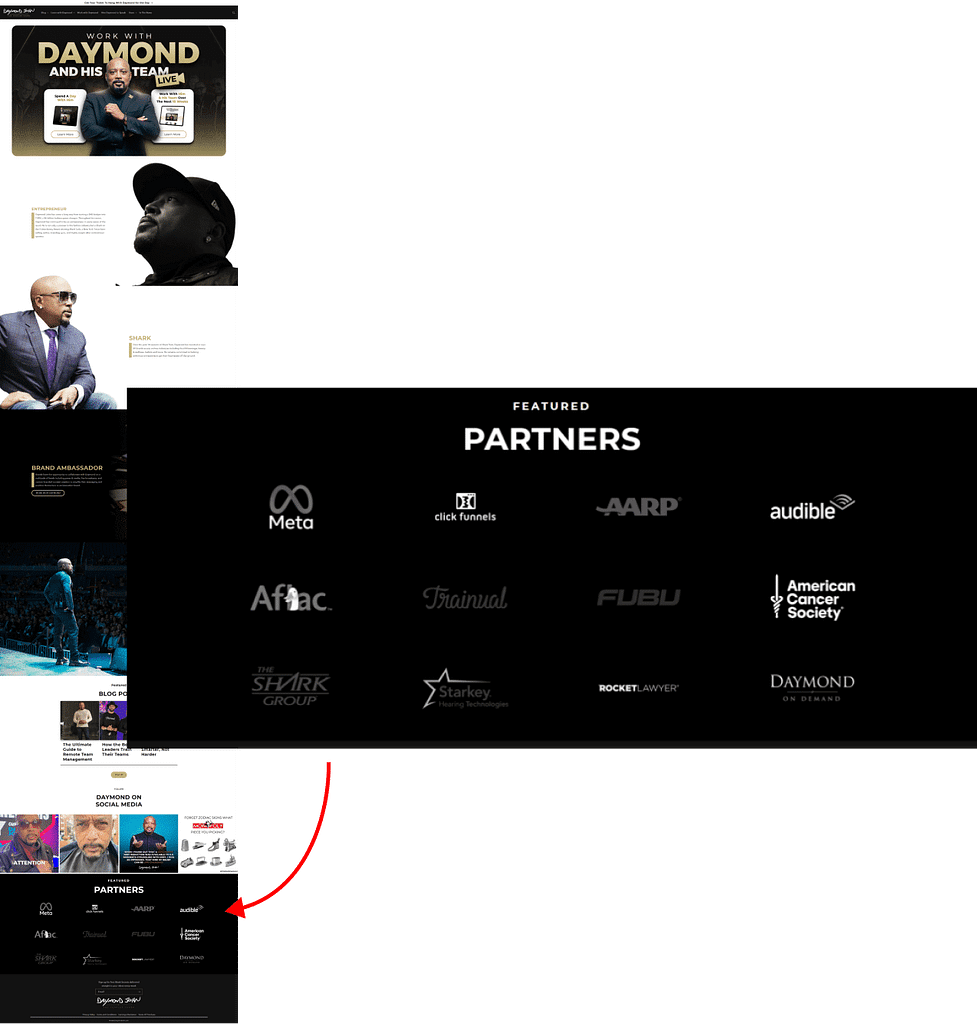
Regular business owners have found success with it, too.

Lady Boss, a weight loss company, built their whole online business using ClickFunnels to sell their workout plans and diet guides.
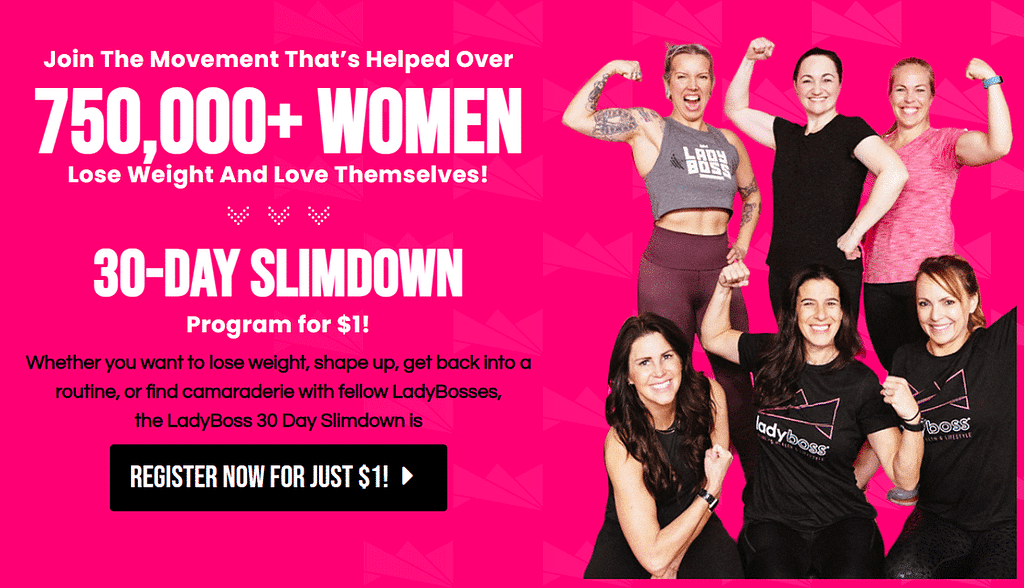
Every month, more than 100,000 people use ClickFunnels.
You’d see way more complaints than success stories if it were a scam. Sure, some people aren’t happy with it – just like some people don’t like their iPhones. But that doesn’t make it a scam.
ClickFunnels has grown so much that they’ve bought other companies, too.
They acquire tools like:
- Geru for graphics.
- Doodly for making whiteboard videos.
- Toonly for animations.
- Voomly for video hosting.
- Talkia for text-to-speech.
- Automatic Script for writing sales copy.
They use their own platform to sell all these tools, showing they trust their system.
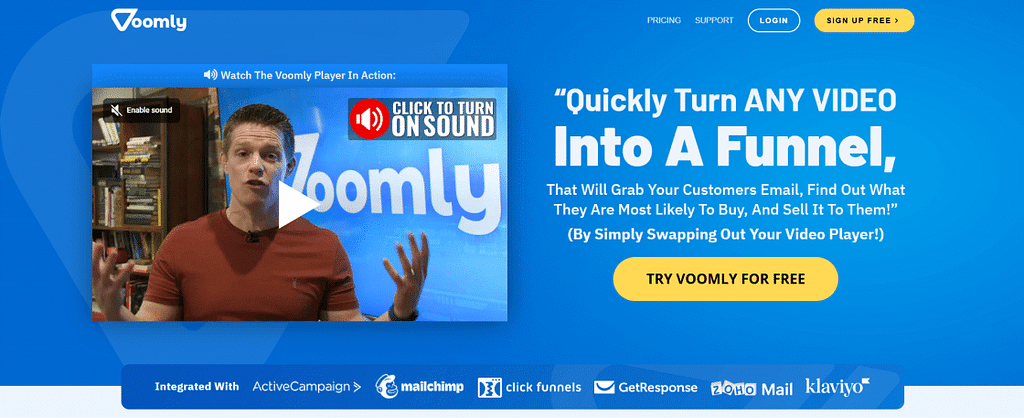
ClickFunnels also has something called the Two Comma Club. These are businesses that made at least a million dollars using their software. They have to show real proof to join – bank statements and all. You can check out these success stories yourself.
Bottom line: You might dislike or hate Clickfunnels’s marketing activities or view Russell Brunson as a 1990s salesman, which may not align with your style. However, Clickfunnels is 100% legitimate.
Why Are There Complaints About Cancelling Subscriptions?
Let’s look at two real customer stories that show what’s actually happening with subscription cancellations. These are genuine complaints that help us understand the big picture.
1. The Forgotten Subscription
A customer signed up for ClickFunnels and used it for just a few days.
Then, life got busy, and they forgot about it. Months later, they got a surprise – their card had been charged every month!

When they asked for their money back, ClickFunnels first said no because their rule is you’re paying for access, not usage.
The result?
ClickFunnels listened and helped out. They saw the customer was having money troubles and gave them a refund as a one-time nice gesture.
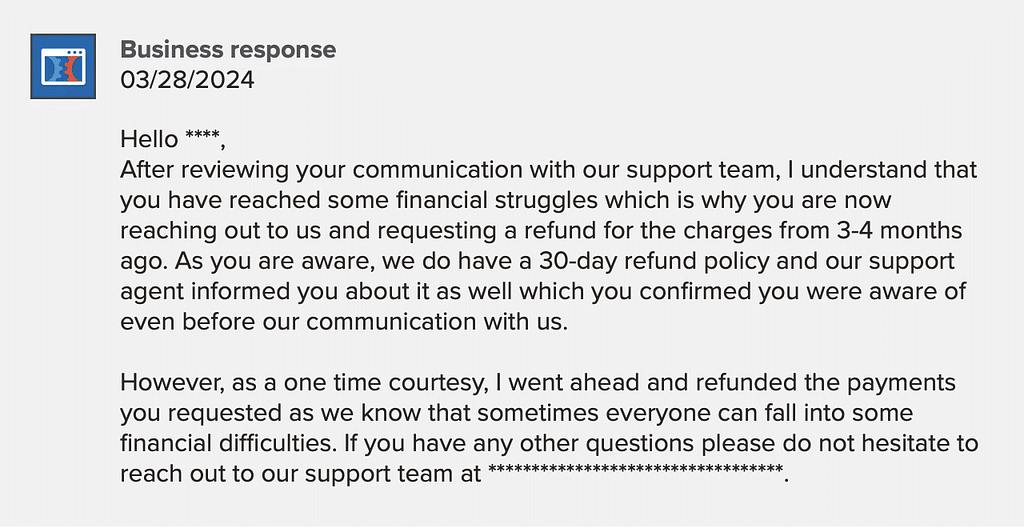
The customer was so happy that they told the Better Business Bureau everything was fixed.
How Do Free Trials Work?
Most online services, including ClickFunnels, work like this: You give them your credit card to start your free trial (though some rare companies don’t ask for it).
With ClickFunnels, you get 14 days to try it free and 30 days to get your money back if you’re unhappy.
That’s 45 whole days to decide!
Once your trial ends, they’ll start charging your card automatically.
So, in this case, if someone forgets about their subscription for months, that’s not the company’s fault.
2. The Confusing Cancellation
There’s often confusion about what “canceling” really means.
Another customer’s story shows a different problem. They used ClickFunnels for just two months in May 2022.
Then, they tried to cancel several times but were charged $9.99.
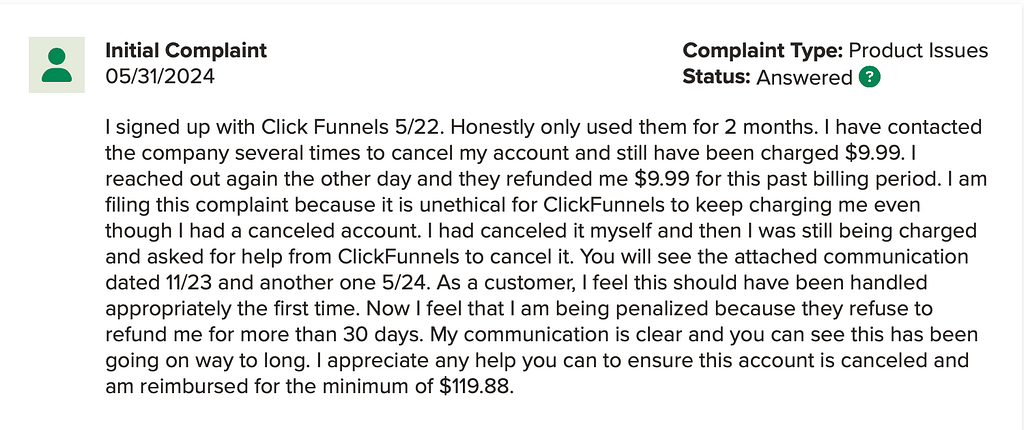
What went wrong?
In my experience, users think pausing their accounts stops the billing—but it doesn’t!
I’ve seen cases where users paused their accounts, thinking they were done, only to find charges continuing on their credit card statements months later.

NOTE: ClickFunnels requires a specific verification process. If you skip any steps, your account will stay active, and the charges will continue.
From the case study above. The most common complaints I’ve noticed include:
- Getting charged after thinking they’d canceled.
- Confusion about the difference between pausing and canceling.
- Frustration with the verification process.
- Surprise charges after free trials end.
Want to avoid these headaches? Here’s the right way to cancel Clickfunnels:
- Log into your ClickFunnels account
- Go to Account Settings
- Click on “Cancel Account”
- Complete the verification process (super important!)
- Keep all confirmation emails
- Check your next statement to confirm the cancellation
ClickFunnels has made some changes to fix these issues. They’ve improved their support team’s response time and clarified their cancellation policy. They now send more reminder emails about trials ending and subscription renewals, too.
Pro Tip: Set a calendar reminder when you first sign up. Mark the end of your trial period and any billing dates. This simple step has saved many users from unexpected charges. Always keep copies of any cancellation requests or confirmation emails you receive.
Are Success Stories and Testimonials Real?
Let’s discuss what real users say about ClickFunnels, not just what the company claims. To get the real story, I like to check review sites that ClickFunnels doesn’t control.
I looked at GetApp and Trustpilot, websites where anyone can leave honest reviews. ClickFunnels gets 4.5 out of 5 stars on GetApp.
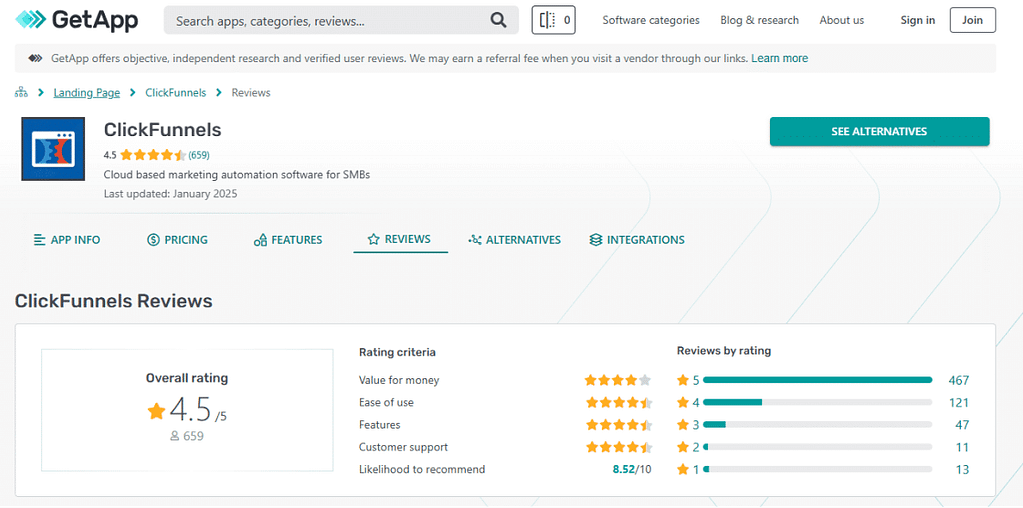
And 4.1/5 on Trustpilot.

That’s like getting a B+ in school—not perfect, but pretty good! Real users write these reviews, and the company can’t change them.
Next, the Two Comma Club – that’s what ClickFunnels calls people who make $1 million using their system.

Some folks think these people cheat by buying their own stuff to hit that number. But that’s silly when you think about it. Here’s why:
Every time you buy something online, the payment company takes a fee—about 3-5% of the sale. If someone tried to FAKE $1 million in sales, they’d lose about $50,000 in fees!
Plus, they’d still have to pay taxes on all that money, making it an even worse idea.
What makes these stories believable? They’re not all about getting rich quickly. Instead, they talk about:
- The mistakes they made along the way.
- How long it took to see results.
- They tried different things before finding what worked.
- Real customers who bought their products.
Most people who use ClickFunnels don’t make millions. But many do grow their business. They’re honest about the work it takes – no magic buttons here!
They share their good days and tough times, making their stories feel real.
These aren’t overnight success stories. They’re about regular people who worked hard and used ClickFunnels as a tool to help their businesses grow. That’s why I trust these stories more than the flashy ads you might see.
What Happens to My Money If I Invest in Courses or Coaching?
Most ClickFunnels courses come with a 30-day money-back guarantee. This means you can try the course for a month and get your money back if you’re not happy (No questions asked)
To reach your full potential, I recommend trying the course. You can’t just purchase, never open, and expect a refund a month later.
Here’s what the refund process looks like:
- Contact Clickfunnels support at [email protected] or from their Help Center
- You have to ask for a refund within 30 days
- DONE
Now, let’s talk about what you get for your money. A basic course like One Funnel Away Challenge costs you $100. Premium courses like Funnel Builder Secrets cost $1997 (including one year using Clickfunnels)
That’s a lot of money! But here’s what’s included:
- Video training you can watch anytime
- Written guides and worksheets
- Access to a private Facebook group
- Templates you can use for your business
- Regular group coaching calls
You should know that they’ll probably try to sell you more stuff during the course. This is pretty normal for online classes, but it can be unpleasant. They might suggest buying:
- Extra training programs
- Special software tools
- Advanced workshops/events (Funnel Hacking Live)
Here’s my honest advice: Start with one basic course. Don’t buy everything they offer right away. Try what you learn in the first course and see if it works for your business. If it does, consider investing in more training.
Remember, NO COURSE CAN GUARANTEE YOU WILL MAKE MONEY.
Your success depends on how well you use what you learn. Some people make back their course money in a few months. Others take longer. It all depends on your business and how much work you put in.
Is the Affiliate Program Legitimate or Predatory?
Yes, Clickfunnels’ Affiliate Program is 100% legit. Here’s the reason why:
- You don’t have to buy anything to be an affiliate.
- You don’t need to own ClickFunnels, take their courses, or recruit other people.
- You just sign up, get your special link, and share it with folks who might need the software.
- There are no levels or downlines like in MLM companies
When someone signs up through your link, you get 30% of what they pay, and every month, they stay subscribed. Here’s what that means in real dollars:
- If someone gets the $97 plan, you earn $29.10 monthly
- If they choose the $297 plan, you get $89.10 monthly
The best part? This keeps coming as long as your referral stays a customer. It’s like getting a thank-you payment every month for making one good recommendation.
But let’s be real – some affiliates make it sound too good to be true.
They show off fancy cars and big houses, claiming it all came from affiliate sales. Here’s the truth: while some make good money, most affiliates earn much less.
Success depends on:
- How many people trust your recommendations
- Whether you can reach people who actually need ClickFunnels
- How well you explain the benefits honestly
ClickFunnels pays affiliates through PayPal or direct deposit and pays on time. I like that they keep track of every sale in a dashboard you can check anytime. They also train you to promote their products without being pushy or misleading.
Bottom Line: The program itself is legit – it’s some of the over-hyped promotional tactics by certain affiliates that give it a bad name.
Learn more:
Misconceptions About ClickFunnels
The biggest problem comes from some pushy affiliates. Many people first hear about ClickFunnels through these affiliates, who make it sound like a way to get rich quick.
They’ll offer “free” sales funnel templates or training programs.
But here’s the catch – people don’t realize they’re actually signing up for ClickFunnels’ monthly subscription ($97-$297).
When the charge hits their credit card, they feel tricked.
Next, some affiliates don’t focus on the software’s real purpose. Instead of explaining how ClickFunnels helps build websites and sell products, they market it as a way to get-rich-quick.
They’ll say things like:
- ClickFunnels changed my life!
- Make millions with my coaching program!
- Leave your job and make millions!
- I made $50,000 in my first month by using Clickfunnels
These aggressive affiliates often use ClickFunnels’ name to sell their expensive coaching programs. This damages ClickFunnels’ reputation and makes people distrust a legitimate business tool.
ClickFunnels is trying to fix these problems by:
- Banning affiliates who use misleading tactics
- Making their pricing clearer upfront
- Offering better refund policies
- Providing more transparent marketing materials
Remember: ClickFunnels is a business tool, not a get-rich-quick scheme. Like other tools in the market like Kartra, Kajabi, Leadpages, etc – its value depends on how well you use it.
Final Verdict – Why ClickFunnels Is Not a Scam or Pyramid Scheme
ClickFunnels is a real business tool that helps people build websites to sell their products online. After looking at all the facts, complaints, and success stories, here’s what you need to know.
What Makes ClickFunnels Real:
- Running strong since 2014 with over 100,000 users
- Has a real office in Idaho and follows tax laws
- Shows real business results
- Gives refunds when people aren’t happy
- Has clear pricing and support
Watch Out For:
- People who promise quick riches using ClickFunnels
- The high monthly cost ($97-$297)
- Website templates that need paid subscriptions
- Expensive training programs
Steps to Try ClickFunnels:
- Start the 14-day free test
- Mark your calendar for when the test ends
- Build one complete sales page
- Look at the total costs
- Begin with basic features
- Learn the canceling rules
- Keep all important emails
Remember these facts:
- ClickFunnels helps you build websites, landing pages, and sales funnels to promote your stuff online.
- Success takes time and effort.
- Many businesses use it well.
- The software works when you learn how to use it.
- Real support exists when you need help.
During your free test, create one complete sales page. This will show you exactly what you can do with the software and whether it’s worth your money.
Bottom line: ClickFunnels works for many businesses. Test it yourself, start small, and decide based on your own results.
Frequently Asked Questions (FAQs)
Additional Insights
Ethical Marketing Practices with ClickFunnels
Let me tell you how to stay safe and spot fake promises when using ClickFunnels.
Only trust what you see on ClickFunnels.com. Some people will try to trick you with “special deals” or “secret ways to get rich.” Don’t fall for it. ClickFunnels costs $97 or $297 per month – if someone offers it for less, they’re not being honest.
Watch out for people who:
- Show off fancy cars and houses
- Say you’ll get rich quick
- Claim they have special discounts
- Push you to buy expensive coaching
- Say their way is the only way to succeed
Real ClickFunnels deals are simple:
- You get 14 days to try it free (90 days if you sign up for the One Funnel Away Challenge at $100)
- You pay monthly after that
- Prices are clear on their website
- No one pushes you to buy extra stuff
- You get regular updates to make the software better
Stay safe by:
- Going to ClickFunnels.com to sign up
- Staying away from random Facebook ads
- Checking real prices on the main website
- Reading what you’re signing up for
- Emailing [email protected] or [email protected] if you’re not sure
No one gets rich overnight. Building a business takes time and work. Learn how to use the software first. Take small steps. Don’t trust anyone who says they have a shortcut to success.
Think about it this way: if someone promises you’ll make thousands in your first month, they’re probably not telling the truth. Stick to the main ClickFunnels website, and you’ll be fine.
Closing Thoughts on Responsible Use of Digital Tools
Building a successful online business isn’t about having fancy tools. It’s about how well you use them.
Think of your business goals first. What do you want to sell? Who are your customers? How will you help them? Answer these questions before spending money on any tool.
ClickFunnels works when you:
- Make a clear plan
- Learn how to use the features
- Test what works for your customers
- Keep track of your costs and sales
- Fix problems when you find them
Don’t focus on:
- Getting rich quick
- Copying others exactly
- Buying every new tool
- Following trendy shortcuts
Smart business owners take their time. They learn one thing well before moving to the next. They test their ideas. They listen to their customers. Most importantly, they know that success takes patience.
Here’s what really works:
- Start small – try one product or service
- Learn from your customers
- Fix what isn’t working
- Grow slowly but surely
- Keep learning new skills
Remember: Tools like ClickFunnels can help you build a business. But they can’t build it for you. Your success comes from understanding your customers and solving their problems. That’s what makes a business work – not the tools you use.
Take your time, learn the basics, and focus on helping your customers. That’s how you build a business that lasts.

Author
Key Nguyen
Key is the brainchild behind Funnelsecrets.us. You’ll often find him analyzing conversion rates, tweaking landing pages, and exploring new marketing automation software. He loves to write about sales funnel building and is always tinkering with the latest conversion optimization techniques!
